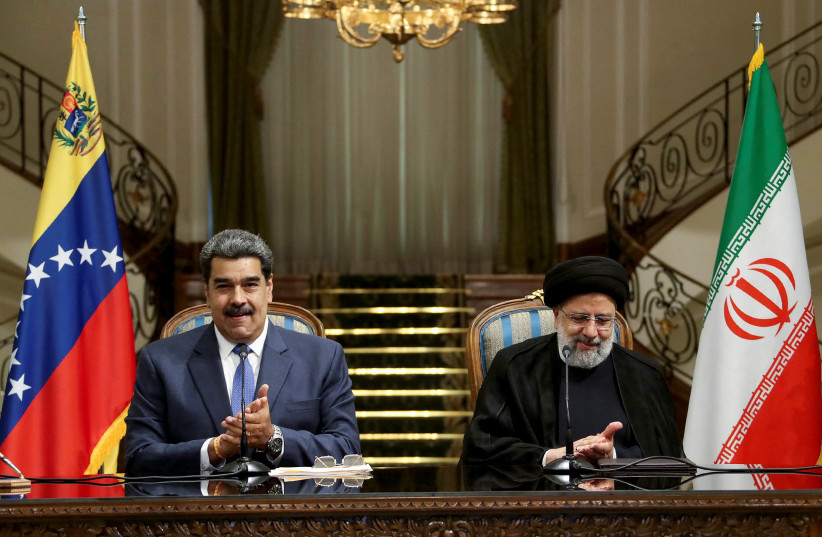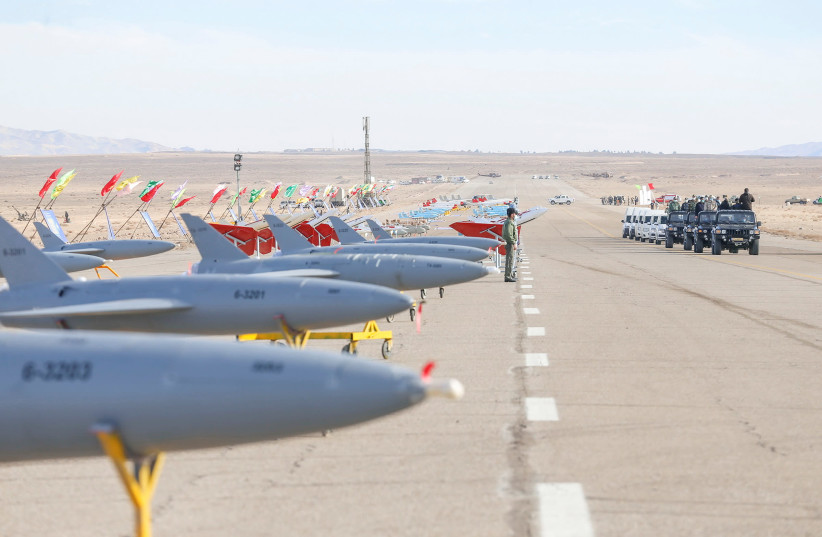Jihadist groups currently have a broad presence in Latin America, where they find benefits that are crucial to their survival and operations, according to John Marulanda, author of the book Yihad en Latinoamérica (Jihad in Latin America).
For more stories from The Media Line go to themedialine.org
Marulanda is a defense and security consultant for multinational energy companies that have a presence on the continent. He is a retired colonel who held several senior positions in the Colombian military, including founder and commander of the 25th Aviation Brigade, founder and first director of the School of Civil-Military Relations, and commander of the Revéis Pizarro Mechanized Cavalry Group on the border with Venezuela.
Iran’s presence in Latin America grew with the political alliance – some would say “bromance” – between then-Venezuelan president Hugo Chávez and his contemporaneous Iranian counterpart Mahmoud Ahmadinejad. They both led large oil-producing countries at the time. This political liaison allowed Iran to create a strong presence in Latin America and it was this Iranian prominence that facilitated the spread of Hezbollah cells across the continent.
Marulanda told The Media Line that even though jihad (Arabic for “struggling,” a term often applied in Islamic contexts to the waging of a holy war) is such a foreign concept for Latin America, jihadist organizations are indeed present in the region.

'A brewing presence of Islamic fighters'
“We believe that there is a brewing presence of Islamic fighters scattered over the Latin American region,” he said.
In the region, says Marulanda, we can see the presence of two jihadist actors, Iran and Hezbollah, with the latter subordinate to the former.
Iran is the main sponsor of jihad all over the world, while Hezbollah is in this case the representative or the one who carries the name of jihad in Latin America, he adds.
Marulanda notes that jihadist groups do not represent an imminent risk for Latin America – at least for now.
“But it is important to point out that jihadists that belonged to Hezbollah were the ones who carried out the terror attack on the Israeli Embassy and later on the AMIA [Jewish center] in 1994 in Buenos Aires, Argentina,” says Marulanda.
“These are the two most severe terrorist attacks in Latin America that emerged from Islamist extremism,” he says.
However, Marulanda notes that as jihad has in the past represented an immediate risk of terrorist attacks in Latin America, today its presence has a different connotation.
He explains that these groups have two main objectives in the region.
The first one, according to Marulanda, is to collect intelligence on soft targets that Israel or the United States have in Latin America, a region where most people follow the Catholic faith.
The second, he says, is to be involved in all illicit activities in the region, such as smuggling, drug trafficking, falsification of documents and money laundering.
These illicit activities, he says, take place in areas such as the tripartite border between Brazil, Argentina and Paraguay, the border between Colombia and Venezuela close to the city of Maicao, or even in the Chetumal region between Mexico and Belize.
“These are suitable regions to be the focus of groups such as Hezbollah and other jihadist organizations, to proliferate or finance themselves,” he explains.
Hezbollah links to drug trafficking across America
Hezbollah launders money that comes from drug trafficking in these territories through banks banned by the American and other world governments, which nonetheless still operate in Latin America.
Marulanda notes that while Iran permanently finances Hezbollah, the current economic woes of the Islamic Republic have had an impact on that funding.
“It is important to remember that Hezbollah is a legal party in Lebanon, but part of the organization is illegal [in much of the world], and after the Middle East, its second-largest center of operations is in Latin America. The money that it earns from illegal activities [there] finances about 60% or 70%” of its operations, he said.
He says that the US government transfers money in a legal and legitimate manner through the United Nations to Palestinian groups in Latin America, which rely on the help of the international community. But, according to Marulanda, “many times, that money is redirected to Hezbollah.”

Hezbollah emboldened due to Iranian presence
Furthermore, Marulanda says, Hezbollah has a strong support system in Latin America that is heavily bolstered by Iranian diplomatic missions in the region.
The jihadist organizations in Latin America are also associated with guerrilla groups such as the Revolutionary Armed Forces of Colombia (FARC). “We have information of how in Venezuela, drug trafficking and terrorist groups such as ELN [the National Liberation Army, a Marxist-Leninist guerrilla group in Colombia] and FARC have maintained permanent contact and joint training with Hezbollah.”
“We have information of how in Venezuela, drug trafficking and terrorist groups such as ELN [the National Liberation Army, a Marxist-Leninist guerrilla group in Colombia] and FARC have maintained permanent contact and joint training with Hezbollah.”
John Marulanda
Besides the Iranian diplomatic representation and local terror organizations, Marulanda says that the Venezuelan government also supports Hezbollah. He singles out Venezuelan Petroleum and Industries and National Production Minister Tareck El Aissami, a former vice president of the country. El Aissami is of Lebanese descent and has fully supported Iran and Hezbollah over the years, he says.
According to Marulanda, Hezbollah even has training centers and many other facilities in Venezuela that they do not have in the rest of Latin America.
However, he adds, that the new political tilt to the left in Latin America makes it likely that more countries will strengthen their ties to Iran, something that would create a political climate favorable to the operations of Hezbollah cells in the region.
Marulanda says Hezbollah could target communities and institutions related to Israel, Jews and the United States, which should all be aware of the danger posed to them by the group’s presence in the region.
“If the relationship between the US and Iran deteriorates in the event that negotiations over the [Iran] nuclear deal fail, it could cause an escalation” in terrorist activity, he warns. “These targets could be attacked to weaken the US presence in Latin America.”
According to Marulanda, the US and the Israeli governments are the most concerned about the Hezbollah presence and activities in the region. “They have their own information methods, their own intelligence channels and bring the situation to the attention of the Latin American governments,” he says.
In fact, he says, the Israeli government “has helped us a lot” with tracking everything that may be happening with Hezbollah in real-time.
Today, there is not one country in Latin America that does not have a presence of Hezbollah cells of varying sizes, Marulanda says, but clarifies that this is not the only jihadist group in the region.
Other than Hezbollah, Latin America once had the presence of al-Qaeda and now groups such as the Muslim Brotherhood and other smaller organizations are attempting to establish themselves in the region as well, he warns.
To hear an in-depth discussion in Spanish on jihadism in Latin America, listen to The Media Line’s new Spanish-language podcast, Medio Oriente 123, hosted by Debbie Mohnblatt. In the second episode, Mohnblatt is joined by John Marulanda, author of the book Yihad en Latinoamérica (Jihad in Latin America).
